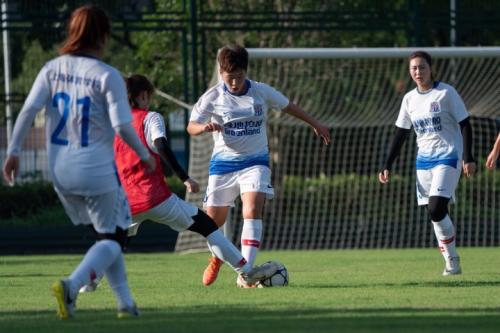




Chinese Super League club Shanghai Shenhua has launched a women's team in partnership with Shanghai University of Sport.
The new outfit, officially called Shanghai Greenland Shenhua and Shanghai University of Sport Team, comprises 25 players and will compete in the China Women's Third Division later this year. With an average age of 20, all the players are students at the university.
The move is part of wider efforts to promote the women's game in China.
Head coach Ye Zhijing said over the next few years the team will strive to gain promotion to the top-tier Super League, where former Paris Saint-Germain playmaker and national team star Wang Shuang currently plies her trade.
"We have always planned to form a female team, but we started to prepare early this year because the Chinese Football Association has mandated that each club needs to have a female team by 2020," said Zhu Junwei, deputy general manager of Shenhua.
According to Zhu, there are benefits for both institutions-the student players will have access to logistical support, professional coaching and high-quality facilities, while the club will be able to tap into the university's rich knowledge base.
"We used to be an amateur team, but joining Shenhua has allowed us to upgrade ourselves in all aspects. We now have more coaches and the training is becoming more specialized," said Ye, who formerly played professionally for the Shanghai women's team.
Defensive midfielder Song Huijie plans to remain with the squad after graduation as she pursues her dream of turning pro.
"I hope to be able to play at higher levels with the team someday. Making the national team is a dream many of us have, as representing the country is the highest honor there is," said the 20-year-old.
All the players attend college courses in the morning and train in the afternoon for two hours, six days a week.
"The college team players are facing pressure on two fronts-academic study and training. This makes them very different from professional players who solely focus on training," said Ye.
"Another issue is continuity-players might leave the team after graduating so the squad might be constantly changing. This is something we will address. But I hope this partnership will encourage more players to stay on after graduation."
Reigning CSL champion Shanghai SIPG told China Daily it is also preparing to form a women's team in partnership with another local college.
Following studies on how professional men's teams in Europe play an important role in promoting and developing women's soccer, the Chinese Football Association has ruled that each CSL club must invest between 15-30 million yuan ($2.1-4.2 million) to establish a women's team.
The move comes at a time when attention on women's soccer is growing, with this summer's Women's World Cup and European club leagues enjoying increased coverage and television ratings.
"The increasing media coverage, the new policies and cooperation formats, and the comments from fans have illustrated that women's soccer is growing in popularity," said Ye.
"However, the number of women playing professional soccer in China is still too small. In Japan, the women's League Two already has more than 20 teams. Here in China, the number is much smaller."
One of the biggest obstacles to development is the mindset of parents.
"A lot of parents only let their daughters play soccer as a form of physical conditioning. They would never allow them to become professional players because it doesn't appear to have good career prospects," Song said.
"Also, female players might have to consider things like marriage and motherhood. This is another barrier to entry."
Moving forward, Ye hopes to see more female coaches in China.
"About 80 percent of women's soccer teams in foreign countries are headed by females," Ye said.
"This is important as female coaches better understand how to manage and train women's teams.
"You cannot just transplant the training approach for men onto a women's team. It's not very effective."
If you have any problems with this article, please contact us at app@chinadaily.com.cn and we'll immediately get back to you.